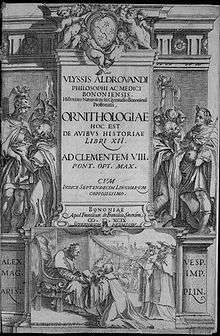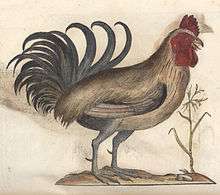Ulisse Aldrovandi
| Ulisse Aldrovandi | |
|---|---|
 | |
| Born |
11 September 1522 Bologna |
| Died |
4 May 1605 (aged 82) Bologna |
| Fields | Naturalist |
| Alma mater | University of Padua |
| Notable students | Volcher Coiter |
Ulisse Aldrovandi (11 September 1522 – 4 May 1605) was an Italian naturalist, the moving force behind Bologna's botanical garden, one of the first in Europe. Carl Linnaeus and the comte de Buffon reckoned him the father of natural history studies. He is usually referred to, especially in older literature, as Aldrovandus; his name in Italian is equally given as Aldroandi.[1]
Early life and education
Aldrovandi was born in Bologna to a noble family, which sent him to apprentice with merchants, but he found his vocation, after studying humanities and law at the universities of Bologna and Padua and becoming a notary. Successively his interests extended to philosophy and logic which he combined with the study of medicine.
He obtained a degree in medicine and philosophy in 1553 and started teaching logic and philosophy in 1554 at the University of Bologna. In 1559 he became professor of philosophy and in 1561 he became the first professor of natural sciences at Bologna (lectura philosophiae naturalis ordinaria de fossilibus, plantis et animalibus).
Arrest for heresy
In June 1549 he was accused and arrested for heresy, for espousing the anti-trinitarian beliefs of the Anabaptist Camillo Renato. By September he had published an abjuration, but was transferred to Rome, and remained in custody or house arrest till absolved in April 1550. During this time he befriended many local scholars. While in semi-captivity there he became more and more interested in botany, zoology and geology (he is credited for the invention/first written record of this word [2]). From 1551 onward, he organized a variety of expeditions to the Italian mountains, countryside, islands, and coasts in order to collect and catalogue plants.
Natural history work

In the course of his life he would assemble one of the most spectacular cabinets of curiosities, his "theatre" illuminating natural history comprising some 7000 specimens of the diversità di cose naturali, of which he wrote a description in 1595. Between 1551 and 1554 he organised several expeditions to collect plants for a herbarium, among the first botanizing expeditions. Eventually his herbarium contained about 4760 dried specimens on 4117 sheets in sixteen volumes, preserved at the University of Bologna. He also had various artists, including Jacopo Ligozzi, Giovanni Neri, and Cornelio Schwindt, make illustrations of specimens.
Botanic garden
At his demand and under his direction a public botanic garden was created in Bologna in 1568, now the Orto Botanico dell'Università di Bologna.[3] Due to a dispute on the composition of a popular medicine with the pharmacists and doctors of Bologna in 1575 he was suspended from all public position for five years. In 1577 he sought the aid of pope Gregory XIII (a cousin of his mother) who wrote to the authorities of Bologna to reinstate Aldrovandi in his public offices and request financial aid to help him publish his books.
Collections
His vast collections in botany and zoology he willed to the Senate of Bologna; until 1742 the collections were conserved in the Palazzo Pubblico, then in the Palazzo Poggi, but were distributed among various libraries and institutions in the course of the nineteenth century. In 1907 a representative part were reunited at Palazzo Poggi, Bologna, where the 400th anniversary of his death was memorialized in a celebrative exhibition in 2005.
List of works
Of the several hundred books and essays he wrote, only a handful were published during his lifetime:
- Antidotarii Bononiensis, siue de vsitata ratione componendorum, miscendorumque medicamentorum, epitome (1574)
- Ornithologiae, hoc est de avibus historia (Bologna, 1599) 1637 edition
- Ornithologiae tomus alter cum indice copiosissimo (Bologna, 1600)
- De animalibus insectis libri septem, cum singulorum iconibus ad viuum expressis (Bologna, 1602) 1637 edition
- Ornithologiae tomus tertius, ac postremus (Bologna, 1603) 1637 edition
- De reliquis animalibus exanguibus libri quatuor (Bologna, 1606)
- De piscibus libri V, et De cetis lib. vnus (Bologna, 1613)
- Quadrupedum omnium bisulcorum historia (Bologna, 1621)
- Serpentum, et draconum (Bologna, 1640) (Natural History of Snakes and Dragons)
- Monstrorum historia cum Paralipomenis historiae omnium animalium (Bologna, 1642) Digital edition by the University and State Library Düsseldorf (Bononiae, 1658)
- Musaeum metallicum in libros IV distributum Bartholomaeus Ambrosinus (Bologna, 1648)
- Dendrologiae naturalis scilicet arborum historiae libri duo sylua glandaria, acinosumq (Bologna, 1667) .
Honors
- The wrinkle ridge Dorsa Aldrovandi on the Moon is named after him.
- The Civico Orto Botanico "Ulisse Aldrovandi" in San Giovanni in Persiceto is named in his honor.
- The plant genus Aldrovanda is named after him.
Gallery
-

Basilisk from Serpentum, et draconum historiae libri duo (1640)
-

Harpy from Monstrorum Historia (1642)
-

Two headed lizard from Historia serpentum et draconum (1640)
-

Specimens of Nature
-

Owl
-

Blue-Headed Quail-Dove
-

Paduan Hen
-

Paduan Rooster
-

Turcicus Rooster
-

Blackbuck
-

Red Hartebeest and Blackbuck
-

Red Hartebeest and Mountain Coati
References
- ↑ As in the title page of his Le antichita de la citta di Roma brevissimamente raccolte, 1556.
- ↑ Four centuries of the word geology: Ulisse Aldrovandi 1603 in Bologna
- ↑ Conan 2005, p. 96.
- ↑ "Author Query for 'Aldrovandi'". International Plant Names Index.
Further reading
- Castellani, Carlo (1970). "Ulisse Aldrovandi". Dictionary of Scientific Biography 1. New York: Charles Scribner's Sons. pp. 108–110. ISBN 0-684-10114-9.
- Findlen, Paula (1994). Possessing Nature: Museums, Collecting, and Scientific Culture in Early Modern Italy. Berkeley: University of California Press.
- Conan, Michel, ed. (2005). Baroque garden cultures: emulation, sublimation, subversion. Washington, D.C.: Dumbarton Oaks Research Library and Collection. ISBN 9780884023043. Retrieved 21 February 2015.
- Ulisse Aldrovandi e la Toscana: carteggio e testimonianze documentarie, Alessandro Tosi (ed.), Olschki, Firenze 1989
External links
- De Avibus Historiae (1666)
- AMS Historica – Ulisse Aldrovandi – University of Bologna
- Homepage of the Aldrovandi museum in Bologna
- Michon Scott, "Ulisse Aldrovandi"
- "Celebrazione per il IV centenario..." (in Italian)
- "Erbari essicati"
- Braque du Bourbonnais by Aldrovandi
- Ulisse Aldrovandi at arthistoricum.net
- Online Galleries, History of Science Collections, University of Oklahoma Libraries High resolution images of works by and/or portraits of Ulisse Aldrovandi in .jpg and .tiff format.
- "Ornithologiae ... libri XII" at the GDZ (Latin)
- Serpentum, et draconum historiae libri duo (1640) - digital facsimile from Linda Hall Library
- Musaeum Metallicum (1648) - digital facsimile from Linda Hall Library
- Ornithologiae (3 vols., 1599) - digital facsimiles from Linda Hall Library
- De quadrupedib.' digitatis viviparis libri tres... (1663) - digital facsimile from Linda Hall Library
| Wikimedia Commons has media related to Ulisse Aldrovandi. |
|